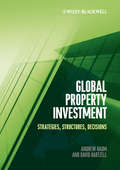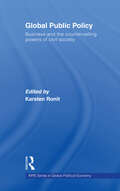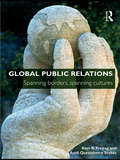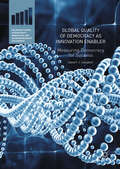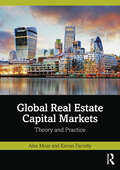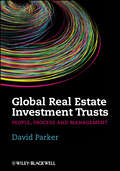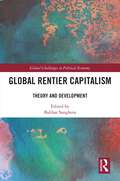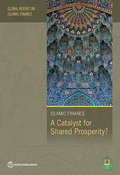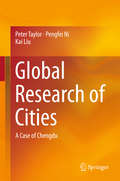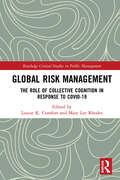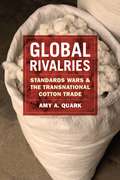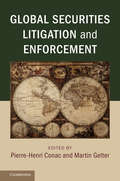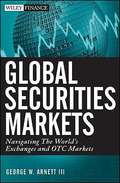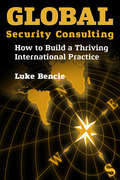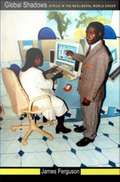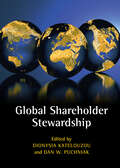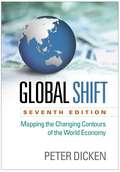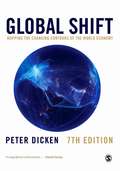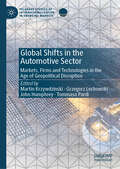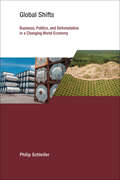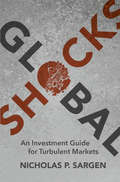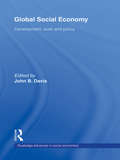- Table View
- List View
Global Property Investment: Strategies, Structures, Decisions
by Andrew E. Baum David HartzellDevelopments in the sophistication of global real estate markets mean that global real estate investment is now being executed professionally. Thanks to academic enquiry, professional analysis and entrepreneurial activity, backed by the globalisation of all investment activity, there is now an available body of material which forms the basis of this scholarly but practical summary of the new state of this art. The measurement, benchmarking, forecasting and quantitative management techniques applied to property investments are now compatible with those used in other asset classes, and advances in property research have at last put the ongoing debate about the role of real estate onto a footing of solid evidence. The truly global scope and authorship of this book is unique, and both authors here are singularly well qualified to summarise the impact and likely future of global innovations in property research and fund management. Between them, they have experienced three real estate crashes, and have observed at first hand the creation of the real estate debt and equity instruments that led to the global crisis of 2008-9. Global Property Investment: strategies, structure, decisions offers a unique perspective of the international real estate investment industry with: a close focus on solutions to real life investment problems no excessive theoretical padding a target of both students and professionals highly qualified dual-nationality authorship With many cases, problems and solutions presented throughout the book, and a companion website used for deeper analysis and slides presentations (see below), this is a key text for higher-level real estate students on BSc, MSc, MPhil and MBA courses worldwide as well as for practising property professionals worldwide in fund management, investment and asset management, banking and real estate advisory firms.
Global Public Policy: Business and the Countervailing Powers of Civil Society (RIPE Series in Global Political Economy)
by Karsen RonitWe are in a critical period where civil society organizations actively influence business political behaviour, while corporations and business associations are adopting new and flexible strategies aimed at closer contact with civil society. Against the backdrop of such broad reorientations, this book analyzes the new and changing roles of business and civil society actors to offer an accurate portrayal of the formation of global public policy. With contributions from leading experts in the field, it investigates the potential for, and emergence of, new policy arrangements along with their patterns of conflict and cooperation. Building upon theoretical inspirations from various traditions studying international affairs, this volume develops and applies the concepts of policy arrangements and countervailing power to the field of global business - civil society relations. A range of key issues including labour, consumers, global finance, the mining industry, climate policy and the World Economic and Social Forums are examined. Global Public Policy will be of strong interest to students and researchers of international political economy, international relations and international business.
Global Public Relations: Spanning Borders, Spanning Cultures
by Alan R. Freitag Ashli Quesinberry StokesThis text provides a structured and practical framework for understanding the complexities of contemporary public relations. It is an instructional book that guides the reader through the challenges of communication and problem solving across a range of organizations and cross-cultural settings. Written in a straightforward, lively style, the book covers: foundational theories, and factors that shape the discipline communication across cultures trends affecting the public relations profession throughout the world. Incorporating case studies and commentary to illustrate key principles and stimulate discussion, this book also highlights the different approaches professionals must consider in different contexts, from communicating with employees to liaising with external bodies, such as government agencies or the media. Offering a truly global perspective on the subject, Global Public Relations is essential reading for any student or practitioner interested in public relations excellence in a global setting. A companion website provides additional material for lecturers and students alike: www.routledge.com/textbooks/9780415448154/
Global Quality of Democracy as Innovation Enabler: Measuring Democracy for Success (Palgrave Studies in Democracy, Innovation, and Entrepreneurship for Growth)
by David F.J. CampbellThis book assesses the interconnectedness of democracy and economic development. It concentrates on how to conceptualize and to measure democracy and quality of democracy in global comparison. The author makes the argument that a quality-of-democracy understanding based on sustainable development relates crucially with economic growth, but more so with economic development. The empirical macro-model focuses on approximately over hundred countries (in a world model) and covers about a fourteen-year period of 2002-2015, identifying the following basic dimensions as being relevant for further analysis: freedom, equality, control, sustainable development, and self-organization (political self-organization). Readers will appreciate the global perspective the work offers.
Global Real Estate Capital Markets: Theory and Practice
by Alex Moss Kieran FarrellyThis book unravels the complex mechanisms involved in global real estate capital markets, enabling the reader to understand how they have grown and evolved, how they function, what determines market pricing, and how the public and private debt and equity markets are linked to each other.Using their extensive professional experience, the authors combine a structured, rigorous understanding of the theory and academic evidence behind the main concepts with practical examples, applications, case studies, quizzes and online resources. The book will enable readers to understand for example: · Why share prices of real estate companies can differ dramatically from the underlying value of the assets· The differing investment objectives of different categories of investor and how this influences share prices and corporate funding decisions· How sell-side analysts make their recommendations· How buy-side analysts decide which sectors, funds and stocks to allocate capital to· And how ESG considerations are relevant to capital market pricing.The book is designed not just for advanced real estate students, but also for global finance courses, Executive Education short courses and as a primer for new entrants to the sector. It is key reading for the following groups: · Property professionals working for a listed company wanting to understand the relationship between their underlying business and the stock market valuation · Real Estate Private Equity teams looking to understand the valuation disconnect between public and private markets and arbitrage the Parallel Asset Pricing model · Equity/Multi asset/Property analysts/fund managers who need to understand the specific characteristics of real estate vs the other ten equity sectors and understand when to increase and decrease sector weightings.Online materials for this book can be found on the Routledge Resource website at https://resourcecentre.routledge.com/books/9781032288017.
Global Real Estate Investment Trusts: People, Process and Management (Real Estate Issues Ser. #58)
by David ParkerAs real estate investment trusts continue to grow exponentially in Asia and Europe - being already well established in the USA and Australasia - a comprehensive guide to the issues involved in REIT property investment decision making is badly needed. This book draws together the most recent developments in REIT management from academic research and professional practice. It is based on current, original academic research, including structured interviews with the managers of a wide range of different types of REITs as well as the research and publications of others, together with the author's 25 years experience in REIT management. It provides a theoretically robust and practically relevant up to date guide to the property investment decision making process for REITs. Presenting new insights, the author breaks the REIT property investment decision making process down into three phases comprising six stages with 30 sequential steps. Each chapter focuses on one stage of the property investment decision making process and introduces the key people in the REIT management team relevant to the activities in that chapter. The theory and principles are considered and illustrated by application to Super REIT, a $15bn diversified REIT. Global Real Estate Investment Trusts: People, Process and Management fuses not only how REITs should undertake property investment decision making - based on how it is undertaken and the underlying property theory, capital market theory and finance theory - but also why each part of the decision making process is important. This book provides the first sole-authored scholarly work specifically on REITs as a business enterprise and REIT property investment decision making as an holistic and cyclical process. The focus is on principles, making it relevant in each of the four major REIT markets around the world: USA, Europe, Asia and Australasia. An essential book for REIT managers and all those practising professionals involved in the REIT industry - including property practitioners, researchers, lawyers, accountants, bankers and directors around the world.
Global Rentier Capitalism: Theory and Development (Global Challenges in Political Economy)
by Balihar SangheraRecent work on rent and rentierism has offered a distinctive and fresh approach to understanding and explaining contemporary capitalism. Drawing on political economy, economics, geography and sociology, this research has brought together distinct theoretical traditions in original and fertile ways to reshape the study of issues related to class, political-economic change and environmental challenges.This book critically engages with these theoretical resources to analyse and evaluate economies in the Global North and South. It offers historical, theoretical and empirical accounts of rentierism, making important cross-disciplinary and global connections. Its four parts address global rentier capitalism under the headings of historical lessons, theoretical developments and empirical studies of rentierism in the Global North and South. It will be the first book of its kind to offer a global account of rentier capitalism.It will be of immense interest to readers in economics, political economy, sociology, geography and development studies.
Global Report on Islamic Finance 2016: A Catalyst for Shared Prosperity?
by World Bank;Islamic Development BankIncome inequality has increased considerably in the aftermath of the financial crisis of 2007†“08 to the extent that one percent of global population possess almost half of the global assets. Whereas the development community is unanimous to tackle growing inequality and imbalance in the distribution of wealth, there is a difference of opinion as to the approaches to achieve this goal. This report presents a perspective from Islamic finance on how shared prosperity can be enhanced. The theoretical framework for economic development by Islamic economics and finance is based on four fundamental pillars: (i) an institutional framework and public policy oriented to the development objectives of Islam; (ii) prudent governance and accountable leadership; (iii) promotion of the economic and financial system based on risk sharing; and (iv) financial and social inclusion for all, promoting development, growth, and shared prosperity. There is evidence that Islamic finance is experiencing high growth with the banking sector leading the way. Several countries are working seriously towards developing standards, regulation and legal frameworks for the development of Islamic finance. However, there are a number of aspects where policy interventions or improvements in policy effectiveness are needed to develop Islamic finance to promote shared prosperity. Without the enabling environment, Islamic finance may not be able to attain the potential expected of it. With adequate policy interventions and enabling financial infrastructure, Islamic finance could become a catalyst for alleviating poverty and inclusive prosperity.
Global Research of Cities
by Peter Taylor Kai Liu Pengfei NiThis book, written by the national think tank of China, presents a comprehensive analysis of the key elements and unique characteristics in Chengdu's development into a global city. To do so, it adopts both external and internal perspectives: externally, it highlights Chengdu's agglomeration and linkage so as to identify the differences in its overall development in comparison with other world cities. Internally, it explores the behavior of companies within the city as the root motive for urban development. The authors investigate how businesses grow and promote the agglomeration, linkage and diversity of cities in the growth process, helping readers understand the contribution of businesses to urban development.
Global Risk Management: The Role of Collective Cognition in Response to COVID-19 (ISSN)
by Louise K. Comfort Mary Lee RhodesThe rise and spread of Covid-19 in the beginning of 2020 presents a once-in-a-century challenge and opportunity for decision makers, managers, scholars, and citizens to understand the risks, mitigate its impact and prepare for future crises. Drawing on a global network of scholars, this book presents a comparative analysis of ten nations’ response to a global pandemic, while operating nominally under the framework of the World Health Organization. The book introduces the concept of ‘collective cognition’ as an analytic lens for examining the nations’ response to Covid-19 during the first six months of the emerging pandemic (January – June 2020) and draws out insights for improving systems of global risk management. This book addresses four primary audiences: policy-makers and leaders in nations struggling to contain viruses while guiding their societies under threat; academic researchers, students, and educators engaged in preparing the next generation of professionals committed to investigating emerging risk: managers of non-profit and private organizations that operate and maintain the networks of social, technical, and economic services that are essential to functioning communities; and the informed general public interested in understanding this extraordinary sequence of events and in managing the novel risk of COVID-19 in a more informed, responsible way.
Global Risk Management: The Role of Collective Cognition in Response to COVID-19 (Routledge Critical Studies in Public Management)
by Louise K. Comfort Mary Lee RhodesThe rise and spread of Covid-19 in the beginning of 2020 presents a once-in-a-century challenge and opportunity for decision makers, managers, scholars, and citizens to understand the risks, mitigate its impact and prepare for future crises. Drawing on a global network of scholars, this book presents a comparative analysis of ten nations’ response to a global pandemic, while operating nominally under the framework of the World Health Organization. The book introduces the concept of ‘collective cognition’ as an analytic lens for examining the nations’ response to Covid-19 during the first six months of the emerging pandemic (January – June 2020) and draws out insights for improving systems of global risk management. This book addresses four primary audiences: policy-makers and leaders in nations struggling to contain viruses while guiding their societies under threat; academic researchers, students, and educators engaged in preparing the next generation of professionals committed to investigating emerging risk: managers of non-profit and private organizations that operate and maintain the networks of social, technical, and economic services that are essential to functioning communities; and the informed general public interested in understanding this extraordinary sequence of events and in managing the novel risk of COVID-19 in a more informed, responsible way.
Global Rivalries: Standards Wars and the Transnational Cotton Trade
by Amy A. QuarkAs the economies of China, India, and other Asian nations continue to grow, these countries are seeking greater control over the rules that govern international trade. Setting the rules carries with it the power to establish advantage, so itOCOs no surprise that everyone wants a seat at the tableOCoor that negotiations over rules often result in stalemates at meeting of the World Trade Organization. Nowhere is the conflict over rule setting more evident than in the simmering OC standards warsOCO over the rules that define quality and enable the adjudication of disputes. aIn "Global Rivalries," Amy A. Quark explores the questions of how rules are made, who makes them, and how they are enforced, using the lens of cottonOCoa simple commodity that has become a poignant symbol of both the crisis of Western rule making power and the potential for powerful new rivals to supplant it. Quark traces the strategies for influencing rule making processes employed not only by national governments but also by transnational corporations, fiber scientists, and trade associations from around the globe. Quark analyzes the efficacy of their approaches and the implications for more marginal actors in the cotton trade, including producers in West Africa. By placing the current contest within the historical development of the global capitalist system, "Global Rivalries "highlights a fascinating interaction of politics and economics.
Global Securities Litigation and Enforcement
by Pierre-Henri Conac Martin GelterGlobal Securities Litigation and Enforcement provides a clear and exhaustive description of the national regime for the enforcement of securities legislation in cases of misrepresentation on financial markets. It covers 29 jurisdictions worldwide, some of them are important although their law is not well known. It will be an invaluable resource for academics and students of securities litigation, as well as for lawyers, policy-makers and regulators. The book also provides a comprehensive contribution debate on whether public or private enforcement is preferable in terms of development of securities markets. It will appeal to those interested in the legal origins theory and in comparative securities law, and shows that the classification of jurisdictions within legal families does not explain the differences in legal regimes. While US securities law often serves as a model for international convergence, some of its elements, such as securities class actions, have not been adopted worldwide.
Global Securities Markets
by George W. Arnett IIIThe quick guide to understanding the global securities markets Investing in the global securities markets poses challenges far beyond simply choosing a security that's likely to provide a decent return. Global Securities Markets provides a framework for navigating through these highly diverse and complex markets, covering all the basics of global investing. Packed with tables and listings to help investors of all types easily locate the information they need to make the right choices, the book is an indispensible index for working the securities markets to their fullest extent. The book covers: The mechanics of execution, clearing, settlement, custody, regulation, and practice in the US, UK, and European markets Margin, short selling, prime brokerage, and the evolving disciplines of risk management, anti-money laundering, and international compliance With 110 securities exchanges and 40 derivatives exchanges, it is more important than ever for the savvy investor to understand the global securities markets, and Global Securities Markets illustrates the rich history of the markets, how they work, and relevant contemporary legal concepts.
Global Security Consulting: How to Build a Thriving International Practice
by Luke BencieWith new security threats nearly every week all over the globe, governments and businesses are forced to take extraordinary measures to protect themselves. Likewise, espionage continues at levels comparable to the days of the Cold War--but many more players are now participating. In this environment, a new industry has grown to deal with these challenges: international security consulting. Drawing from military, law-enforcement, and intelligence communities, new private companies are springing up across the world. Global Security Consulting, written by a former intelligence specialist who has built a successful consultancy, provides solid guidance for anyone wishing to enter this glamorous but often dangerous field.
Global Services Outsourcing
by Ronan McivorServices outsourcing is an increasingly attractive option for firms seeking to reduce costs and achieve service improvements. Many organisations now choose to transfer responsibility for entire functions such as human resources, finance and information technology services to both local and global vendors. Yet outsourcing such functions is a complex process, one that is driven by factors that transcend cost considerations alone. Issues such as service design, unbundling processes, managing work across different cultures and time zones, and business process redesign have all become important elements of managing services outsourcing arrangements. This book uses tools and techniques from a variety of disciplines to show how to successfully plan, implement and manage services outsourcing arrangements. Based on in-depth analysis of large-scale outsourcing arrangements across a wide range of sectors, this is an excellent resource for both academics and practitioners who wish to understand more about this complex phenomenon.
Global Shadows: Africa in the Neoliberal World Order
by James FergusonBoth on the continent and off, "Africa" is spoken of in terms of crisis: as a place of failure and seemingly insurmountable problems, as a moral challenge to the international community. What, though, is really at stake in discussions about Africa, its problems, and its place in the world? And what should be the response of those scholars who have sought to understand not the "Africa" portrayed in broad strokes in journalistic accounts and policy papers but rather specific places and social realities within Africa? In Global Shadows the renowned anthropologist James Ferguson moves beyond the traditional anthropological focus on local communities to explore more general questions about Africa and its place in the contemporary world. Ferguson develops his argument through a series of provocative essays which open--as he shows they must--into interrogations of globalization, modernity, worldwide inequality, and social justice. He maintains that Africans in a variety of social and geographical locations increasingly seek to make claims of membership within a global community, claims that contest the marginalization that has so far been the principal fruit of "globalization" for Africa. Ferguson contends that such claims demand new understandings of the global, centered less on transnational flows and images of unfettered connection than on the social relations that selectively constitute global society and on the rights and obligations that characterize it. Ferguson points out that anthropologists and others who have refused the category of Africa as empirically problematic have, in their devotion to particularity, allowed themselves to remain bystanders in the broader conversations about Africa. In Global Shadows, he urges fellow scholars into the arena, encouraging them to find a way to speak beyond the academy about Africa's position within an egregiously imbalanced world order.
Global Shareholder Stewardship
by Dan W. Puchniak Dionysia KatelouzouThis is the first in-depth comparative and empirical analysis of shareholder stewardship, revealing the previously unknown complexities of this global movement. It highlights the role of institutional investors and other shareholders, examining how they use their formal and informal power to influence companies. The book includes an in-depth chapter on every jurisdiction which has adopted a stewardship code and an analysis of stewardship in the world's two largest economies which have yet to adopt a code. Several comparative chapters draw on the rich body of jurisdiction-specific analyses, to analyze stewardship comparatively from multiple interdisciplinary perspectives. Ultimately, this book provides a cutting-edge and comprehensive understanding of shareholder stewardship which challenges existing theories and informs many of the most important debates in comparative corporate law and governance.
Global Shell Games
by J. C. Sharman Michael G. Findley Daniel L. Nielson Michael G. Findley Daniel L. NielsonEvery year a staggering number of unidentified shell corporations succeed in hiding perpetrators of terrorist financing, corruption and illegal arms trades, but the degree to which firms flout global identification standards remains unknown. Adopting a unique, experimental methodology, Global Shell Games attempts to unveil the sordid world of anonymous shell corporations. Posing as twenty-one different international consultants, the authors approached nearly 4,000 services in over 180 countries to discover just how easy it is to form an untraceable company. Combining rigorous quantitative analysis, qualitative investigation of responses and lurid news reports, this book makes a significant research contribution to compliance with international law and international crime and terrorism whilst offering a novel, new approach to the field of political science research. Global Shell Games is an invaluable resource for scholars of international relations, and a fascinating, accessible read for anyone interested in learning about worldwide criminal practice in corporate finance.
Global Shift, Seventh Edition
by Peter DickenThe definitive text on globalization, this book provides an accessible, jargon-free analysis of how the world economy works and its effects on people and places. Peter Dicken synthesizes the latest ideas and empirical data to blaze a clear path through the thicket of globalization processes and debates. The book highlights the dynamic interactions among transnational corporations, nations, and other key players, and their role in shaping the uneven contours of development. Mapping the changing centers of gravity of the global economy, Dicken presents in-depth case studies of six major industries. Now in full color throughout, the text features 228 figures. Companion websites for students and instructors offer extensive supplemental resources, including author videos, applied case studies with questions, lecture notes with PowerPoint slides, discipline-specific suggested further reading for each chapter, and interactive flashcards. New to This Edition: *Every chapter thoroughly revised and updated. *All 228 figures (now in color) are new or redesigned. *Addresses the ongoing fallout from the recent global financial crisis. *Discussions of timely topics: tax avoidance and corporate social responsibility; global problems of unemployment, poverty, and inequality; environmental degradation; the Eurozone crisis; and more. *Enhanced online resources for instructors and students.
Global Shift: Mapping the Changing Contours of the World Economy
by Peter DickenGlobal Shift is - quite simply - the definitive work on economic globalization. The extensive use of graphics, lack of jargon, and clear definition of terms has made it the standard work for the social sciences. The Seventh Edition has been completely updated using the latest available sources. It maps the changing centres of gravity of the global economy and explains the global financial crisis. Each chapter has been extensively rewritten and new material introduced to explain the most recent empirical developments; ideas on production, distribution, consumption; and corporate governance. Global Shift provides: The most comprehensive and up-to-date explanation of economic globalization available, examining the role of transnational corporations, states, labour, consumers, organizations in civil society, and the power relations between them. A clear guide to how the global economy is being transformed through the operation of global production networks involving transnational corporations, states, interest groups and technology. Extended discussion of problems and institutions of global governance in the context of the global economic crisis and of the role of corporate social responsibility. A suite of extensive online ancillaries for both students and lecturers, including author videos, case studies, lecture notes, and free access to specially selected journal articles related to each chapter. There is only one definitive guide to economic globalization for the social sciences: Peter Dicken's Global Shift is it.
Global Shifts in the Automotive Sector: Markets, Firms and Technologies in the Age of Geopolitical Disruption (Palgrave Studies of Internationalization in Emerging Markets)
by John Humphrey Martin Krzywdzinski Grzegorz Lechowski Tommaso PardiThe automotive industry is undergoing fundamental organizational changes related to the transition from the production of internal-combustion-engine vehicles towards the production of low- or no-emission powertrain technologies. In addition, the ongoing transformations in this sector are shaped by the dramatically changing geopolitical context – including the increasing technological rivalry between China and the West. In response, this edited volume offers an in-depth examination of the automotive industry, with emphasis on the ongoing transformations in the international divisions of labour, the regional and national production models, and the established value-chain relations. Collecting contributions from established and emerging scholars from a range of disciplinary perspectives, the book brings together empirical research on different regions relevant for the changing globalized production system of the automotive sector – including the European Union, East Asia, and North America.
Global Shifts: Business, Politics, and Deforestation in a Changing World Economy
by Philip SchleiferWhat global shifts in markets and power mean for the politics and governance of sustainability.In recent years, major shifts in global markets from North to South have created a new geography of trade and consumption, particularly in the agricultural sector. How this shift affects the governance of sustainability, and thus the future of the planet, is the pressing topic Philip Schleifer takes up in this book. The processes of twenty-first-century globalization are fundamentally changing the politics and governance of commodity production, Schleifer argues, with profound implications for the environment in the food-producing countries of the Global South. At the center of Schleifer's study are Brazil and Indonesia—two key sites of experimentation in new models of global environmental and commodity governance—where palm oil and soy supply chains have seen unprecedented degrees of private environmental governance in recent years. However, instead of transforming these industries, the diffusion of transnational sustainability standards has accompanied a worsening ecological crisis, with mounting evidence of increasingly strong links between deforestation and globalization in twenty-first-century agricultural trade. To uncover the causes of this governance failure, Schleifer develops a multi-level framework for analyzing how contemporary globalization is reconfiguring the political economies of such industries. The result is the first comprehensive analysis of the shift of global agricultural trade to the South and the deepening crisis of commodity-driven deforestation—and a complex and evolving picture of both the risks and opportunities for sustainability presented by this transformative shift.
Global Shocks
by Nicholas P. SargenThis book, which is written from a practitioner's perspective, fills the void by providing the reader with a toolkit and guiding principles to manage money when markets are in turmoil. It features ten case studies beginning with the breakdown of the Bretton Woods fixed exchange rate system through the current situation in which investors are assessing whether China could become the next bubble. Each chapter discusses how the respective crisis or bubble unfolded at the time, the way policymakers and markets responded, and the optimal strategy for positioning portfolios. The goal is to share these experiences and the lessons from them, so investors will be better prepared for future shocks. The opening chapter explores whether there are common patterns in movements of interest rates and exchange rates that investors can exploit. A conceptual framework is presented that helps explain why this is the case for traditional currency crises, but less so for asset bubbles. The concluding chapter ties the episodes together and considers how the nature of financial crises has evolved since the collapse of Bretton Woods. We cite factors that make it difficult for policymakers and investors to detect problems in advance of an asset bubble. The good news is investors get a second chance to outperform when markets are over-sold; however, they need to formulate a strategy to limit the damage during the sell-off phase and to capitalize on the eventual recovery.
Global Social Economy: Development, Work and Policy (Routledge Advances In Social Economics Ser. #14)
by John B. DavisThis book addresses ‘global social economy’ which addresses the relation of capitalism to human flourishing, the role of international governance in the world economy, the transformation of work and use of time in internationalizing economies, cross-country developments in gender, poverty, and ageing, and ethics economic policy issues in the international economy. This edited collection examines the social nature of capitalism today, the possibilities for social and economic development in the world under the democratic leadership of the United Nations, and the middle ground between market and hierarchy occupied by gift exchange as a means of coordinating economic value creation and the creation of knowledge. It considers long term issues in the global social economy concerning gender and discrimination, intergenerational poverty transmission, and the role of ageing. From a variety of internationally acclaimed contributors, this collection introduces new social economic perspectives on the global economy that contest the neoliberal Washington Consensus view dominant until recent financial crises.
